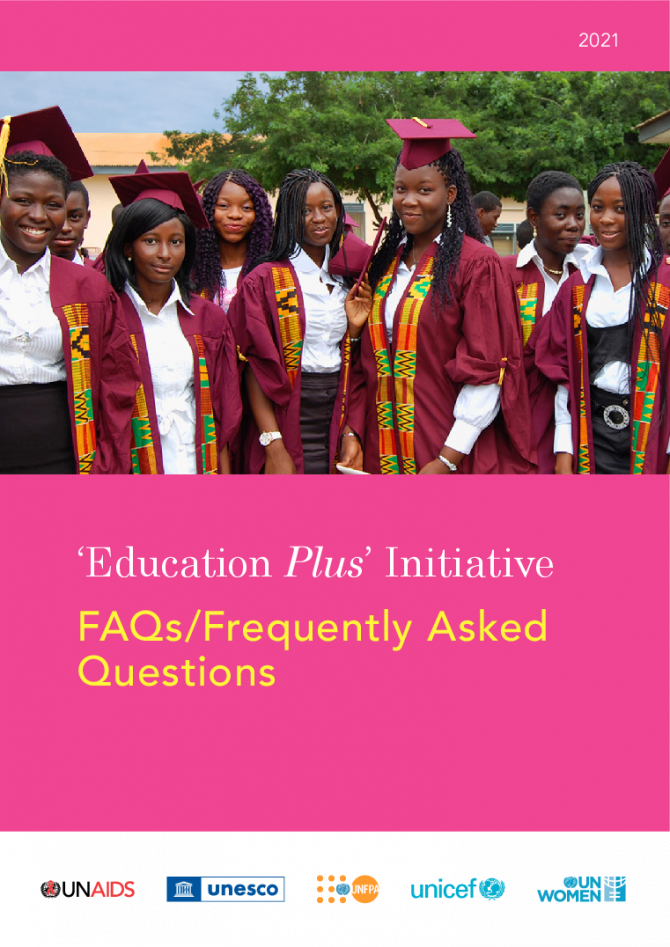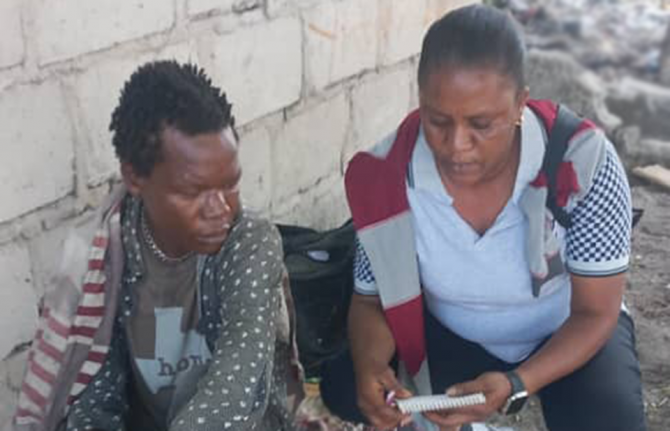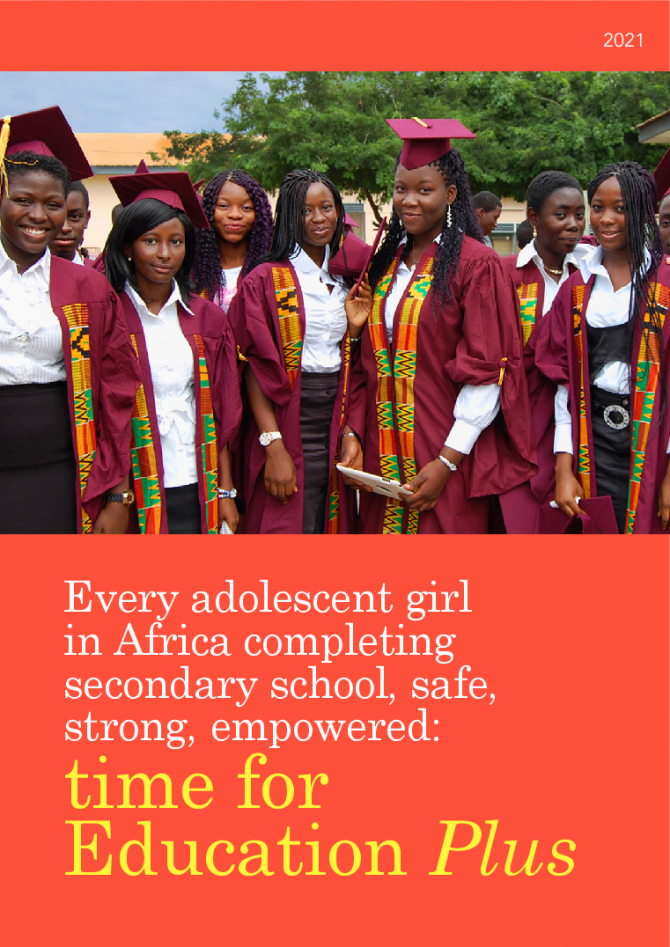
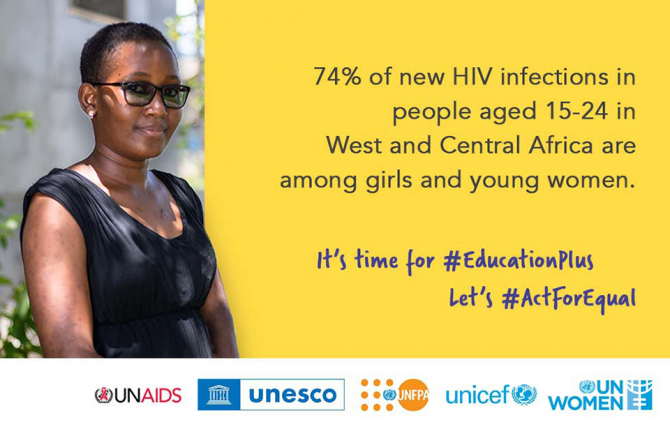
Feature Story
Invest in adolescent girls’ and young women’s rights, education and health to end AIDS in Western and Central Africa
02 November 2021
02 November 2021 02 November 2021Leaders from governments, civil society and the United Nations have renewed their commitment to make urgent and strategic investments in adolescent girls’ and young women’s rights, education and health. At a three-day regional summit on HIV/AIDS held in Dakar, Senegal that concluded with a call to action, the Education Plus initiative was applauded as a timely intervention to address the high number of adolescent girls and young women acquiring HIV in the Western and Central Africa region.
The Education Plus Initiative, a high-level political advocacy drive to accelerate actions and investments to prevent HIV, was launched as a joint commitment of UNAIDS, UNESCO, UNFPA, UNICEF and UN Women at the Generation Equality Forum in July this year. The Education Plus initiative is centred on the empowerment of adolescent girls and young women and the achievement of gender equality in sub-Saharan Africa—with secondary education as the strategic entry point for providing the multi-sectoral plus package. The initiative calls for free and quality secondary education for all girls and boys in sub-Saharan Africa by 2025; universal access to comprehensive sexuality education; fulfilment of sexual and reproductive health and rights; freedom from gender-based and sexual violence; school-to-work transitions, and economic security and empowerment.
While the Western and Central Africa region has progressed in girls’ education over the last two decades, the UNICEF 2019 report found that “the region still has the highest gender gaps in education in the world”. One in four adolescent girls aged 15-19 who have ever been married or in union, has experienced emotional, physical, or sexual violence at the hands of a husband or partner.
HIV/AIDS remains a major public health threat in the Western and Central Africa where 4.7 million people are living with HIV—12% of those living with HIV globally—but experiences 22% of all AIDS deaths in the world. Adolescent girls and young women (aged 15-24) in West and Central Africa are twice as likely to acquire HIV than their male peers. Five in six new HIV infections (82% / 18,237 females) among adolescents 15-19 years are among females. Three-quarters (74%) of new HIV infections in the age group 15-24 in the region are in females (40,432 females / 13,860 males). Every week, approximately 800 adolescent girls and young women in WCA are newly infected with HIV.
Secondary education offers protection to adolescent girls and young women from HIV—with reductions in HIV incidence among girls who complete secondary education by as much as one-third to one half in some countries.
However, most countries in Western and Central Africa are falling short of meeting the target of allocating 20 percent of government resources to education as required under the African Union’s Dakar Commitment on Education for All. Before the COVID19 pandemic, only Burkina Faso, São Tome and Principe, Senegal, Sierra Leone and Togo allocated at least 20 percent of their national budgets to education. As a percentage of GDP, education spending varies from 1.1 percent in Central African Republic to 7.7 percent in Sierra Leone.
Before COVID-19 struck, around 34 million secondary school-aged girls in sub-Saharan Africa were being denied a full 12-years of education and an estimated 24% of adolescent girls and young women (15–24 years) in the region were not in education, training or employed, compared to 14.6% of young men. UNICEF estimates that in 2020 school closures due to COVID-19 impacted around 250 million students in the sub-Saharan Africa region, millions of whom may never return to the classroom-especially girls.
To date, five countries—Benin, Cameroon, Gabon, Lesotho and Sierra Leone—have signed on to champion the initiative with a wide range of commitments that will tackle the urgency of effectively addressing the alarming numbers of adolescent girls and young women acquiring HIV and dying from AIDS-related illnesses, among other threats to their survival, well-being, human rights and freedoms, including sexual and gender-based violence and teenage pregnancy.
The Education Plus initiative is committed to advancing young women’s leadership as key to ending AIDS as a public health threat and in rebuilding communities and countries during and post pandemic.
Quotes
“The lessons learned from the success in accelerating gender parity in primary education, need to be implemented for secondary education. Guaranteeing the completion of quality secondary education for every adolescent girl is a must-do. That is why we are excited about the ground-breaking Education Plus Initiative on the empowerment of adolescent girls and young women in sub-Saharan Africa, that I am co-leading with my sister Executive Directors of UNESCO, UNICEF, UNFPA and UN Women.”
“The evidence has shown us that HIV epidemic in West and Central Africa is feminized with women and girls bearing the brunt of new HIV infections and care of people living with HIV. The disproportionately high HIV infection among women and girls is fuelled by the systematic, structural and institutionalized gender inequalities that put women and girls at a disadvantage throughout the life cycle.”
"In The Gambia we have a lot of government schools. Apparently, it’s free. But that just means not paying tuition. Some families are worried about buying three meals a day - and yet they need to worry about buying schoolbooks. To donors investing in secondary education and governments who are supposed to be doing that, I’d say you should be investing specifically in what students need. "
“One pathway to women’s empowerment is through Education Plus. If a woman is not educated, she will be unable to take up any of the 30% quota of leadership positions reserved for women in Gabon, who will in turn make decisions and pass laws that empower girls. The country is intensifying efforts to increase access to education, by breaking down barriers and enabling adolescent girls and young women to take advantage of all the measures put in place by the government for access to quality education.”
“To reduce girls’ vulnerability to HIV, there is need to leverage health sector funding to catalyze cross-sectoral impact in the education sector, particularly to ensure access to sexual and reproductive health services for adolescent girls and young women.”
"Benin is committed to increasing funding for secondary education for girls and training teachers to facilitate a supportive environment."
"We know the solutions; we have the means. Now leaders must be ready to take radical measures. This emergency requires radical measures!"
“Adolescent girls who reach upper primary and lower secondary school face multiple barriers. To address them, we need to take a multi-sectoral approach which not only addresses their education, but also their economic, protection, nutrition, menstrual health and hygiene and HIV prevention needs.”
Related

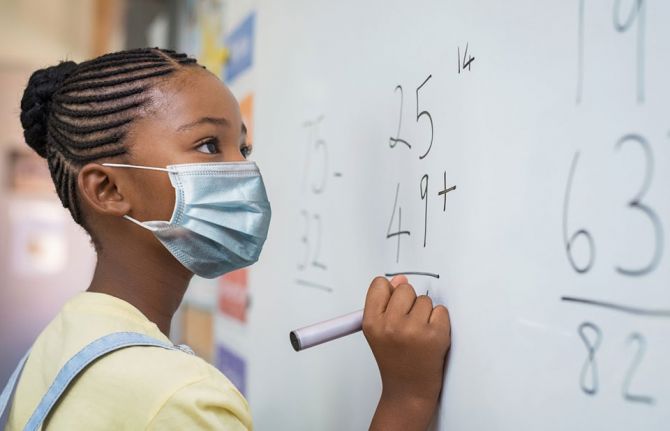
Press Release
Education Plus launched in response to alarming rates of HIV among adolescent girls and young women in Africa
06 July 2021 06 July 2021Unequal gender power dynamics continue to put women and girls at higher risk of acquiring HIV. Six out of seven new HIV infections among adolescents aged between 15 and 19 years in sub-Saharan Africa are among girls and 4200 adolescent girls and young women between 15 and 24 years became infected with HIV every week in 2020
GENEVA, 6 July 2021—Five United Nations organizations have joined forces to launch a new initiative to ensure that all girls and boys in sub-Saharan Africa have equal access to free secondary education by 2025 and to contribute towards preventing HIV. Education Plus, launched at the Generation Equality Forum in Paris, France, is an ambitious five-year high-level drive to accelerate action and investments to expand access to secondary education for all young people and to advance adolescent girls’ and young women’s health, education and rights in sub-Saharan Africa.
Before COVID-19 struck, around 34 million secondary school-aged girls in sub-Saharan Africa were being denied a full education and an estimated 24% of adolescent girls and young women (15–24 years) in the region were not in education, training or employed, compared to 14.6% of young men. One in four young people in sub-Saharan Africa aged 15–24 years are illiterate and the United Nations Children’s Fund (UNICEF) estimates that in 2020 school closures due to COVID-19 impacted around 250 million students in the region, millions of whom may never return to the classroom.
“We know that keeping girls in secondary school can reduce their risk of HIV infection by a third or more in places where HIV is common. It reduces their risk of child marriage, teenage pregnancy and gender-based and sexual violence and it can provide girls with the important skills and competencies for their economic empowerment,” said Winnie Byanyima, Executive Director of UNAIDS. “Bold and consistent political leadership is needed to ensure all children can complete a full round of secondary education in sub-Saharan Africa.”
The co-founders of Education Plus, UNAIDS, UN Women, the United Nations Educational, Scientific and Cultural Organization, the United Nations Population Fund and UNICEF, are urging countries to use education systems as an entry point to provide a holistic “plus” package of essential elements that adolescent girls and young women need as they become adults. These include comprehensive sexuality education, sexual and reproductive health and rights, including HIV prevention, freedom from gender-based violence and economic empowerment through school-to-work transitions.
Anita Myriam Emma Kouassi, a young activist from Benin, called on leaders to go beyond promises and act to end inequalities and gender discrimination against girls and young women in Africa. “Inequalities and illiteracy leave girls without the ability to take charge of their lives early on and without control over choices around their own bodies and health. We are thus left vulnerable without knowing how to defend ourselves or make our voices heard,” she said. “This is the reason why we cannot do without girls’ education; it is the bedrock and pillar of a strong nation with and for girls.”
To date, five countries—Benin, Cameroon, Gabon, Lesotho and Sierra Leone—have signed on to champion the initiative with a wide range of commitments that will tackle the urgency of effectively addressing the alarming numbers of adolescent girls and young women acquiring HIV and dying from AIDS-related illnesses, among other threats to their survival, well-being, human rights and freedoms, including sexual and gender-based violence and teenage pregnancy.
“Over the next three years, we will work to intensify awareness of sex education through training and the development of dedicated pedagogical material. We will support pregnant girls and young mothers in the case of early pregnancy. We will provide quality sanitary facilities and promote easy access to sanitary towels in schools,” pledged Rose Christiane Ossouka Raponda, the Prime Minister of Gabon. “The new Labour Code, which is currently before Parliament, will enrich our legal framework, particularly with regard to harassment in the workplace. Adolescent girls, young women and women as a whole will be even better protected to promote their social and professional development and their empowerment.”
Education has become an urgent concern amidst the COVID-19 pandemic and its socioeconomic impacts, which have increased girls’ and young women’s exposure to gender-based violence, child marriage and unintended pregnancies, increased the risks of maternal mortality and heightened vulnerabilities to acquiring HIV. Girls in sub-Saharan Africa are especially at risk of never returning to school.
David Moinina Sengeh, the Sierra Leone Minister of Basic and Senior Secondary Education, emphasized that countries must make decisions based on evidence and “Stop at nothing to make sure girls, including pregnant girls, are not left out of education,” adding that secondary education should include sexual and reproductive health in educational curricula. “People say it costs money, but it is going to be more expensive to us when we have high illiteracy in the future,” he argued. “It is already expensive to us when we have maternal mortality, it is already expensive to us when we have major parts of our adult population, women, excluded from the economy.”
The President of Sierra Leone, Julius Maada Bio, pledged that the country’s radical new inclusion policy would expand access to previously marginalized populations, including pregnant girls, parent learners, girls from poor backgrounds and those in hard-to-reach areas. “The governmental of Sierra Leone is committed to empowering adolescent girls, promoting and protecting their rights, accelerating progress on gender equality and social inclusion, reducing teenage pregnancy and new HIV infections.”
The initiative places emphasis on ensuring the meaningful participation and leadership of adolescent girls and young women in all their diversity, with attention to ensuring inclusiveness of those in especially excluded and vulnerable situations. Engaging men and boys with a focus on changing harmful gender norms and masculinities, and as allies and agents of change, is a cross-cutting aspect for Education Plus.
In presenting the Prime Minister of Lesotho’s Education Plus commitment, Dira Khama, the Permanent Secretary for Education, pledged that the country would expand secondary education, with a focus on rural areas, strengthen the implementation of comprehensive sexuality education, introduce vocational and technical streams to strengthen school-to-work transitions and work with parents and communities to reduce sexual and gender-based violence against adolescent girls and young women. The Prime Minister also committed, “To review and implement secondary school fees rationalization policy to reduce the amounts of school fees paid by individual households,” within the next six months to a year.
Education Plus will advocate for gender-responsive reforms in policies, laws and practices to guarantee the education, health and other social and economic rights of adolescents and young people. This includes changes in parental consent requirements and eliminating user fees for adolescents to access basic HIV and other sexual and reproductive health services, supporting pregnant adolescents and young mothers to complete their education and tackling gender-based violence, menstrual hygiene management and mental health, among others.
“It is important to look at HIV prevention systematically and not underestimate the special role of mental health when it comes to safe sex practices,” said Shudufhadzo Musida, Miss South Africa 2020. “In order to bring about mental health awareness, HIV prevention, economic empowerment and gender equality, we need to empower the minds of adolescent girls and young women now more than ever.”
Education Plus was launched as a joint commitment to the Generation Equality Forum. At the high-level virtual launch, Ms Byanyima was joined by Sierra Leone’s Minister of Basic and Senior Secondary Education, David Moinina Sengeh, the Tunisian diplomat and former African Union Youth Envoy, Aya Chebbi, a representative of the Education Plus Young Women’s leadership hub, Anita Myriam Emma Kouassi, and Miss South Africa 2020, Shudufhadzo Musida.
Delighted to launch the #EducationPlus initiative at today’s #GenerationEquality Forum - joint programme with @UNICEF, @UNFPA, @UN_Women, @UNESCO.
— Winnie Byanyima (@Winnie_Byanyima) July 1, 2021
We must ensure all girls in Africa and beyond can complete secondary education.
It’s time to #ActForEqual! https://t.co/5JE6axsPMC pic.twitter.com/myRdhKQF6E
UNAIDS
The Joint United Nations Programme on HIV/AIDS (UNAIDS) leads and inspires the world to achieve its shared vision of zero new HIV infections, zero discrimination and zero AIDS-related deaths. UNAIDS unites the efforts of 11 UN organizations—UNHCR, UNICEF, WFP, UNDP, UNFPA, UNODC, UN Women, ILO, UNESCO, WHO and the World Bank—and works closely with global and national partners towards ending the AIDS epidemic by 2030 as part of the Sustainable Development Goals. Learn more at unaids.org and connect with us on Facebook, Twitter, Instagram and YouTube.

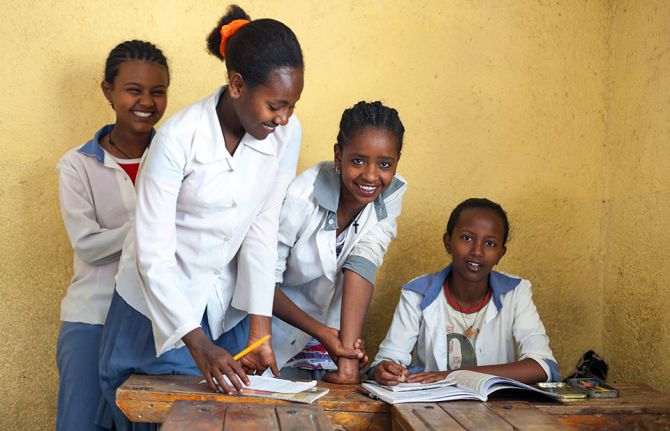
Feature Story
Keeping girls in school reduces new HIV infections
06 April 2021
06 April 2021 06 April 2021Staying in school longer has a protective benefit in reducing the risk of HIV infection. Higher levels of educational attainment among women are also associated with increased control over sexual and reproductive health and rights.
In eastern and southern Africa, a positive association between condom use at last higher-risk sex and completion rates of lower secondary school among adolescent girls and young women has been seen. Additionally, greater gains have been made in reducing new HIV infections among adolescent girls and young women in countries that have higher completion rates for lower secondary school (>50%).
Education Plus, a new advocacy initiative for adolescent girls’ education and empowerment in sub-Saharan Africa, is being launched to step up action to ensure that every girl in sub-Saharan Africa gets a quality secondary education.
oUR WORK

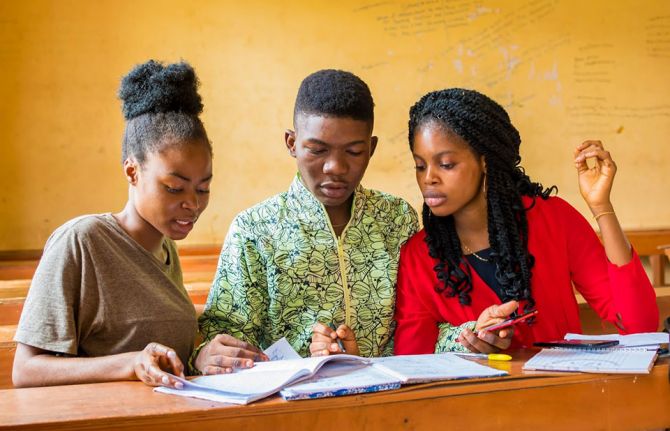
Feature Story
Education Plus—gender justice for adolescent girls and young women in Africa
19 March 2021
19 March 2021 19 March 2021“For a moment, imagine with me. Imagine finding out that you acquired HIV from a boy who did not even know that he was positive and wouldn’t believe that you contracted it from him,” Akosua Agyepong, a youth leader from Ghana, said at a virtual event with key partners of a new flagship initiative, Education Plus.
Ms Agyepong shared her friend’s journey, an 18-year-old struggling to study, access treatment and beat the discrimination that young people living with HIV all too often face in homes, schools, health systems and the community.
This experience, though, is not something of the past. In sub-Saharan Africa every week, an estimated 4500 adolescent girls and young women between the ages of 15 and 24 years acquire HIV, an epidemic that is fuelled by gender injustices and violence. Five in six new HIV infections among adolescents are among girls. Sub-Saharan Africa is also the region with the highest rates of child marriage and teenage pregnancy.
At the event, the UNAIDS Executive Director, Winnie Byanyima, while introducing Education Plus, a new game-changing initiative set up in response to those realities, made worse by the COVID-19 pandemic, implored the audience to reflect on those facts.
“Education Plus brings together governments to demonstrate leadership to make commitments to roll out secondary education that is free and calls on financial institutions and donor countries to support the leadership of African governments. It brings together girls’ movements, women’s movements, human rights movements, all those who care about the human rights of girls and the right to equal opportunity,” Ms Byanyima said.
“This situation is not inevitable. It can change, and it has been changing. We need leadership; we need solidarity; we need partnerships to change it,” she added.
Education Plus—led by the heads of UNAIDS, the United Nations Educational, Scientific and Cultural Organization, the United Nations Population Fund, the United Nations Children’s Fund and UN Women—calls for multisectoral commitments to ensure free quality secondary schooling for all girls and boys. It calls for guaranteed violence-free environments, access to comprehensive sexuality education, the fulfilment of sexual and reproductive health and rights and securing the economic empowerment of young women through successful school-to-work transitions.
Ministers of gender, education and health from African countries echoed the importance of the holistic approach of Education Plus, as did representatives of key partner institutions, including the African Union Commission, the African Development Bank, the European Union and the Global Partnership for Education.
Khumbize Kandodo-Chiponda, the Minister of Health of Malawi, drew from her life experience, calling Education Plus a timely intervention. “It is very close to my heart because I was 16 years old when I got pregnant. So, I can put myself in the shoes of our girls, especially in rural areas. I was lucky that I had an opportunity to go back to school, and indeed stayed in school, graduated up to college,” she said. “Many of our young girls lack the same opportunity. So, I’m very happy about the Education Plus initiative.”
Valentine Uwamariya, Rwanda’s Minister of Education, said that secondary education shouldn’t be a luxury. “To end the threat to the well-being of adolescent girls, including to protect them against HIV, completion of secondary education is key and quality of education means integrating comprehensive sexuality education, as Rwanda has done in the new competency-based curriculum.”
“Every girl deserves the right to an education that is not only inclusive but affordable, available and accessible, as well without fear of judgement and disrespectful treatment, so girls let’s power up!” said Hazel Jojo, a peer educator from Zimbabwe.
Vanessa Moungar, the Director of Gender, Women & Civil Society at the African Development Bank, called for smart investments. “We need to keep working with our governments so that investing in girls’ education is as much a priority as building roads and bridges.”
“We need more of these targeted interventions that tackle the root causes of gender inequality and have a direct pay-off,” said Franz Fayot, the Minister for Development Cooperation of Luxembourg. Véronique Tognifodé Mewanou, Benin’s Minister of Social Affairs and Microfinance and Chair of the African Union Specialized Technical Committee on Gender Equality, pledged support for the initiative.
In line with the initiative’s emphasis on placing the leadership of young women at the centre, the event was moderated by two young leaders, Jennifer Kayombo, from the United Republic of Tanzania, and Lorence Kabasele, from the Democratic Republic of the Congo. The event was hosted by the Governments of Benin and Luxembourg on 17 March and was held on the sidelines of the 65th session of the United Nations Commission on the Status of Women.
Among key backers of the initiative were Pauline Nalova Lyonga Egbe, Minister of Secondary Education, Cameroon, Sarah Mbi Enow Anyang, African Union Commissioner of Education, Science and Technology, and Innovation, Henriette Geiger, Director, Directorate on Human Development, Migration, Governance and Peace at the European Commission, and Alice Albright, the Chief Executive Officer of the Global Partnership for Education.
Education Plus—a chance to fully seize the transformative power of investing in adolescent girls and young women—will be launched during the Generation Equality Forum in Paris, France.
Learn more
Related
 Government ensures continuity of treatment in Malawi
Government ensures continuity of treatment in Malawi

10 February 2025
Documents
Every adolescent girl in Africa completing secondary school, safe, strong, empowered: time for Education Plus
04 February 2021



